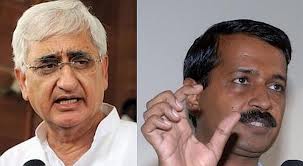
Kaushambi (Uttar Pradesh), October 11: A news channel alleged that the Zakir Hussain Memorial Trust, headed by Congress minister and Union law minister Salman Khurshid and his wife Louise Khurshid, had forged signatures of senior officials in several districts of Uttar Pradesh depriving disabled people of their
money.
According to a TV report, the Union ministry for social welfare and empowerment had granted Rs. 71.50 lakh to the trust for distributing tricycles and hearing aids to the disabled in 17 districts of UP.
While, Salman Khurshid is the president of the Trust, his wife Louise Khurshid is the project director.
As per the rules, the trust should have informed the district magistrate, the district social welfare officers prepares and send a list of beneficiaries from districts and the money is disbursed at the camps organized for this purpose, in the presence of district officials.
But reports state that the Trust distributed the equipments under the forged signatures of district welfare officers and the camps were never held.
The Zakir Hussain Memorial Trust is registered at Khurshid's residence in the national capital (4, Gulmohar Avenue, Jamia Nagar, New Delhi) and the minister's wife - Louise Khurshid, who happens to be a former MLA - is its chief functionary officer.
The trust is registered as an NGO and has been operating in many states and receiving substantial grants from several important ministries of the government of India.
The report states that the Union ministry for social welfare and empowerment had been hinted about this in May 2011, but no one sought an inquiry.
Union ministry of social justice and empowerment has, for the time being, stopped fresh grants to the trust, as Khurshid's family was yet to reply to the clarifications sought by it on the alleged malpractices.
According to reports, documents in possession of the media channel reveal that a statewide enquiry into these malpractices in a project piloted by the trust was ordered by the UP government on January 12, 2012 following a letter from the Union ministry of social justice and empowerment.
The project relates to providing aids to physically challenged people in 17 districts of Uttar Pradesh, including Khurshid's hometown Farrukhabad.
India Against Corruption (IAC) activist Arvind Kejriwal on Wednesday demanded Salman Khurshid's resignation and his wife Louise Khurshid's immediate arrest after the TV channel's report.
"Yesterday it was exposed by one of the TV channels how law minister Salman Khurshid and his wife are involved in defalcation of funds meant for handicapped people. These funds are released by various departments of Government of India," said Kejriwal.
"They were taken by the NGO, which has been floated by the law minister and his wife. And rather than distributing this money to the handicapped people, the law minister and his wife together have forged the signatures of several government officers which is a very serious crime," he added.
Asserting that it is a non-bailable offence and a cognizable offence under various sections of the Indian Penal Code (IPC), Kejriwal demanded that an FIR should be immediately registered in connection with this case.
"Mrs Khurshid should be immediately arrested because if she remains outside she would tamper with the evidence and put pressure on various evidences. And the law minister should immediately resign," he said.
Kejriwal also asked Uttar Pradesh chief minister Akhilesh Yadav to ensure that the FIR in connection with this case is registered as soon as possible so that further investigations can be carried out.
"We demand from the chief minister of Uttar Pradesh who has said that he will investigate. Investigation will only start after the registration of FIR. So, if it is not done, then there would be a suspicion that is Samajwadi Party (SP) in Uttar Pradesh is in cahoots with UPA Government at the Centre that the Central government is helping Mulayam Singh with his corruption cases and here whether Akhilesh Yadav is helping Salman Khurshid at the Centre," he said.





Comments
Add new comment